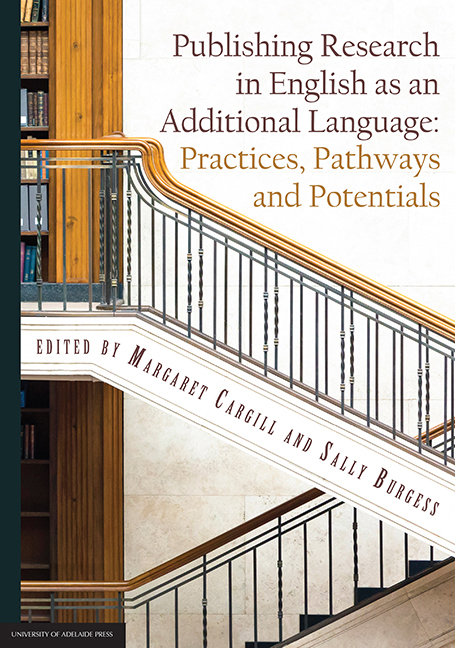Book contents
- Frontmatter
- Contents
- List of contributors
- Acknowledgements
- Foreword
- Introduction: Unpacking English for Research Publication Purposes [ERPP] and the intersecting roles of those who research, teach and edit it
- 1 Accept or contest: A life-history study of humanities scholars’ responses to research publication policies in Spain
- 2 Introducing research rigour in the social sciences: Transcultural strategies for teaching ERPP writing, research design, and resistance to epistemic erasure
- 3 Blurring the boundaries: Academic advising, authors’ editing and translation in a graduate degree program
- 4 The delicate art of commenting: Exploring different approaches to editing and their implications for the author-editor relationship
- 5 The CCC Model (Correspondence, Consistency, Correctness): How effective is it in enabling and assessing change in text-editing knowledge and skills in a blended-learning postgraduate course?
- 6 How credible are open access emerging journals? A situational analysis in the humanities
- 7 Disseminating research internationally: Intra-subdisciplinary rhetorical structure variation in immunity and allergy research articles
- 8 Scientists publishing research in English from Indonesia: Analysing outcomes of a training intervention to inform institutional action
- 9 ‘The one who is out of the ordinary shall win’: Research supervision towards publication in a Chinese hospital
- 10 The geopolitics of academic plagiarism
- 11 Training ‘clerks of the [global] empire’ for 21st-century Asia? English for Research Purposes (ERP) in Vietnam
- 12 Standardisation and its discontents
- Reflections and future directions in publishing research in English as an Additional Language: An afterword
2 - Introducing research rigour in the social sciences: Transcultural strategies for teaching ERPP writing, research design, and resistance to epistemic erasure
Published online by Cambridge University Press: 16 March 2018
- Frontmatter
- Contents
- List of contributors
- Acknowledgements
- Foreword
- Introduction: Unpacking English for Research Publication Purposes [ERPP] and the intersecting roles of those who research, teach and edit it
- 1 Accept or contest: A life-history study of humanities scholars’ responses to research publication policies in Spain
- 2 Introducing research rigour in the social sciences: Transcultural strategies for teaching ERPP writing, research design, and resistance to epistemic erasure
- 3 Blurring the boundaries: Academic advising, authors’ editing and translation in a graduate degree program
- 4 The delicate art of commenting: Exploring different approaches to editing and their implications for the author-editor relationship
- 5 The CCC Model (Correspondence, Consistency, Correctness): How effective is it in enabling and assessing change in text-editing knowledge and skills in a blended-learning postgraduate course?
- 6 How credible are open access emerging journals? A situational analysis in the humanities
- 7 Disseminating research internationally: Intra-subdisciplinary rhetorical structure variation in immunity and allergy research articles
- 8 Scientists publishing research in English from Indonesia: Analysing outcomes of a training intervention to inform institutional action
- 9 ‘The one who is out of the ordinary shall win’: Research supervision towards publication in a Chinese hospital
- 10 The geopolitics of academic plagiarism
- 11 Training ‘clerks of the [global] empire’ for 21st-century Asia? English for Research Purposes (ERP) in Vietnam
- 12 Standardisation and its discontents
- Reflections and future directions in publishing research in English as an Additional Language: An afterword
Summary
Introduction
A recurring theme of scholarly work in English for Research Publication Purposes [ERPP] has been the potentially causal relationship between the global dominance of English for ‘international’ publication and the suppression of alternative knowledges. The titles of presentations in the recent PRISEAL conference on international publication reflect support for this view in phrases such as ‘English as the international language of science’ (emphasis in the original), ‘ … domain loss and the erosion of specialized discourse in non-Anglophone cultures’, ‘English-monolinguist research policies in Spain’, and so on (PRISEAL, 2015, n.p.). The perceived disadvantages experienced by researchers in non-mainstream contexts have been richly analysed (Lillis & Curry, 2010; Clavero, 2010) and contentiously debated (Flowerdew, 2008; Casanave, 2008; Hyland, 2016a). Meanwhile, quantitative studies such as those by Mertkan, Arsan, Cavlan and Aliusta (2016) in educational management have drawn some resonant conclusions about today's academy: ‘[T]he complexity of knowledge-production … is marked by disproportionate influence of an exceptionally small set of core inner-circle Anglophone and non-innercircle Anglophone settings’ (p. 13; see also Lillis & Curry, 2015).
In parallel to these findings, among Asian scholars too is a belief that ‘an obsession with theoretical knowledge from the West reproduces Euro-American intellectual dominance in the global-local knowledge hierarchies’ (Qi, 2015, p. 195). Nguyen, Elliott, Terlouw and Pilot (2009, p. 109) draw specific attention to Asian contexts ‘where rapid reforms in education may run the risk of “false universalism”’ involving the relatively uncritical adoption of various Western approaches. This is seen to open the way for ‘mental colonialism to continue and neocolonialism to triumph’ (p. 112). From a European perspective, Bennett (2014) also argues that this process ‘ultimately represents the colonisation of one culture by another — in this case, the “imposition of new ‘mental structures’ through English”’ (pp. 45-6, citing Phillipson; see also Bennett, 2015). And for me too, despite the obvious diversity of contextual outcomes, the strong form of this argument remains convincing (see Cadman, 2014).
- Type
- Chapter
- Information
- Publishing Research in English as an Additional LanguagePractices, Pathways and Potentials, pp. 33 - 54Publisher: The University of Adelaide PressPrint publication year: 2017

